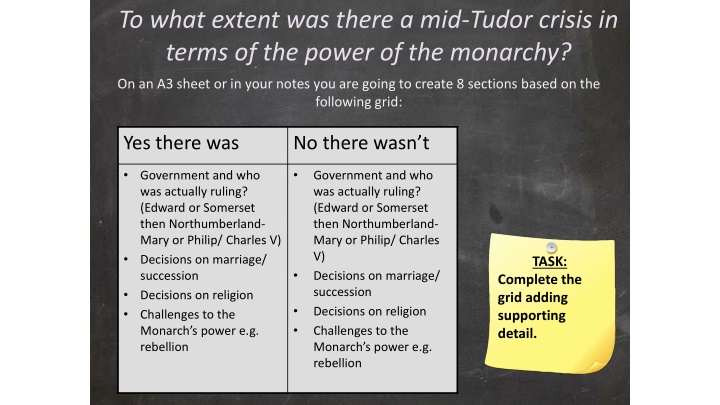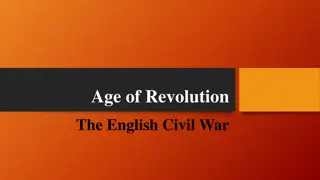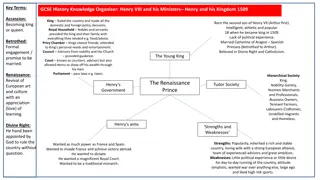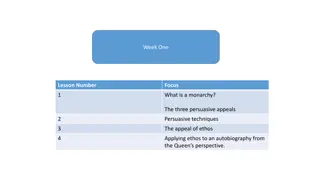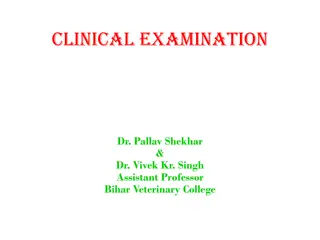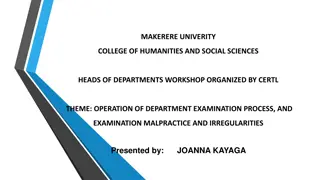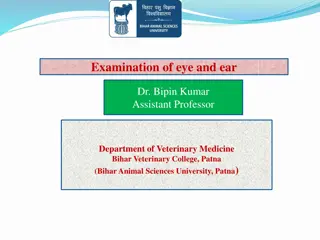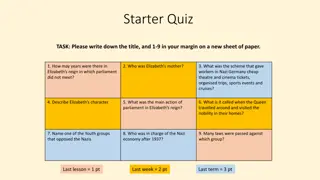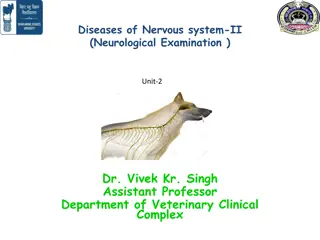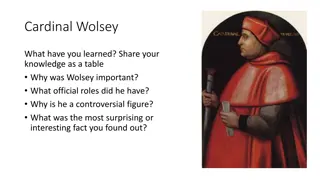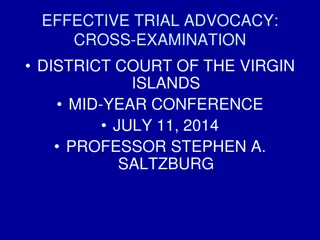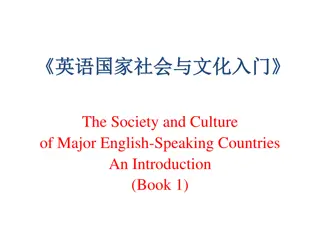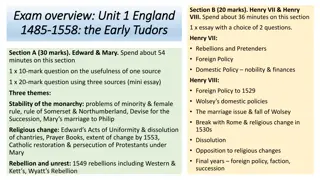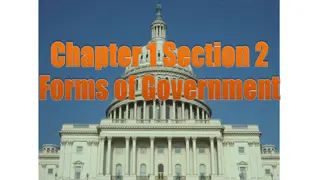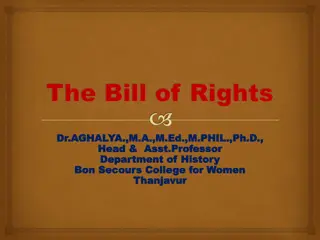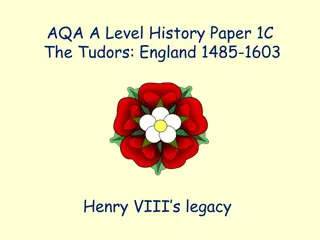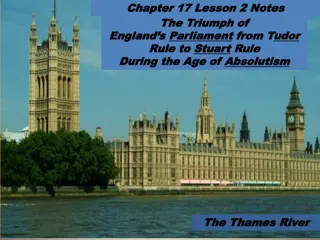Examination of the Mid-Tudor Crisis: Power Struggles and Challenges to Monarchy
The mid-Tudor era witnessed a crisis in the power of the monarchy, as evident through issues of government authority, decisions on marriage and succession, religious policy, and challenges to royal power. The complexities of ruling under Edward VI, Mary I, and their advisors, along with crucial events like Wyatt's Rebellion, highlight the intricacies of this period.
Download Presentation

Please find below an Image/Link to download the presentation.
The content on the website is provided AS IS for your information and personal use only. It may not be sold, licensed, or shared on other websites without obtaining consent from the author.If you encounter any issues during the download, it is possible that the publisher has removed the file from their server.
You are allowed to download the files provided on this website for personal or commercial use, subject to the condition that they are used lawfully. All files are the property of their respective owners.
The content on the website is provided AS IS for your information and personal use only. It may not be sold, licensed, or shared on other websites without obtaining consent from the author.
E N D
Presentation Transcript
To what extent was there a mid-Tudor crisis in terms of the power of the monarchy? On an A3 sheet or in your notes you are going to create 8 sections based on the following grid: Yes there was No there wasn t Government and who was actually ruling? (Edward or Somerset then Northumberland- Mary or Philip/ Charles V) Decisions on marriage/ succession Decisions on religion Challenges to the Monarch s power e.g. rebellion Government and who was actually ruling? (Edward or Somerset then Northumberland- Mary or Philip/ Charles V) Decisions on marriage/ succession Decisions on religion Challenges to the Monarch s power e.g. rebellion TASK: Complete the grid adding supporting detail.
To help you We will go over some aspects as a class There are slides on this Power Point to help you You will use the Old A2 textbooks to find more precise detail: Edward Chapter 1 Mary Chapter 2 On the blog: Starkey on Edward and Mary, Revision Section
Starkey https://www.youtube.com/watch?v=5mRFbmSga_4 On devise and succession from 40 mins Who does Starkey Suggest was responsible for the Devise?
Marys Marriage options Mary was determined to get married in order to produce a Catholic heir. She was 37, so this was an urgent matter. There were two possible candidates for a husband Edward Courtenay and Philip of Spain: Edward Courtenay (Earl of Devon) Philip of Spain Main supporter Family Bishop Gardiner Great Grandson of King Edward IV Sir William Paget Son of Emperor Charles V; cousin of Mary; heir to Spanish throne Spanish 25 Staunchly Catholic Nationality Age Religion English 25 Catholic (although rumoured to have Protestant sympathies.) Personality Immature and unbalanced. Arrested at the age of 11 and kept in solitary confinement for 14 years. Studied in prison but inexperienced in politics and world affairs. Didn t understand how to treat people at court. Boring and unimaginative. Views marrying Mary as his duty rather than a pleasure. Experienced. Good administrator. Political skills Advantages Popular with the English people Could help closer links with Spain and the Netherlands (already Britain s biggest trading partner) Could England become a colony of the powerful Spanish empire? Emperor Charles wanted to use England to help in his wars against France. As a foreigner, he was unpopular with the English people. Disadvantages Was a Yorkist could there be a return to Wars of the Roses? Could lead to more factional rivalry as would make Courtenay s family more powerful.
KEY POINT: Wyatts Rebellion was significant, even though it failed. The rebellion is significant for us as historians; it demonstrates several things about England in 1554: Although Protestants were in a minority, their opinions could not be ignored entirely. There was clearly a significant amount of unease about the prospect of a foreign marriage. The rebellion was also significant in terms of its impact on key individuals of the time: Lady Jane Grey, who had been imprisoned since Mary took the throne, was executed; her father had supported Wyatt, and Mary believed Jane could be a figurehead for future Protestant rebellions. Princess Elizabeth was imprisoned in the Tower of London, though Mary eventually had her released (no charges were ever pressed against her.) Does the Spanish marriage and Wyatt s rebellion suggest weakness in the power of the monarchy
The Whitney Jones Theory Mid- Tudor Crisis Weak rulers Edward VI was merely the pawn of Somerset and Northumberland Somerset genuinely cared about the people of England, but was a poor politician; his policies were a major cause of the 1549 rebellions Northumberland was a better politician, but his policies were morally questionable, and benefitted the rich at the expense of the poor Mary I was intolerant and dogmatic; this was demonstrated by the burning of heretics. She appeared to be controlled by Philip.
Rebellions The Western Rebellion of 1549 was largely a reaction to Somerset s religious reforms Kett s Rebellion of the same year was caused by economic factors Wyatt s Rebellion can be traced to Mary s marriage to Philip, among other factors
Faction fighting and unstable government Somerset came to power after a power struggle between conservative and radical elements within Henry s government. Despite the execution of his brother, Somerset continued to be the victim of faction fighting, ultimately leading to the rise of Northumberland Northumberland himself had to quell an attempted coup by Somerset
Religion This was a period of huge religious change, including the moderate Protestant reform of Somerset, the radical Protestant reform of Northumberland, and the return to traditional Catholicism under Mary Religious reforms significant in both the Western Rebellion + Wyatt s Rebellion Mary failed to get all her religious reforms through Parliament (members would not return Monastic Land despite words of Pope)
Strengths of the Rulers Counter Argument Although Edward was weak, Somerset and Northumberland were more effective than has traditionally been recognised. In particular, Northumberland inherited many problems and dealt with them efficiently. Mary had achievements in military and economic policy; her failures were the result of bad luck and a lack of time. Ultimately, during this period, civil war was avoided, Parliament survived, England remained independent, and important financial reforms took place.
Rebellions The three Rebellions were not a major threat Many of the rebels were more concerned about local issues, and most remained loyal to the monarchs. (Some of Kett s rebels even shouted God Save the King! ) Class conflict related to the rebellions has been exaggerated; all three rebellions were marred by mistakes and disorganisation
Government The state and the monarchy were strong enough to survive short-term political maneuverings (as shown by the unsuccessful coups of Thomas Seymour, Somerset, and the Devise) Although there was faction fighting, it stayed within the Council rather than destabilising wider society. Several experienced figures stayed in office throughout the period - including William Paget, William Herbert and William Cecil. This provided continuity and stability.
Religion Edward managed to bring in major Protestant reform, notably with Northumberland. Clearly driven by Edward and failure to match his ambition was one reason for fall of Somerset. Edward s reign saw growth of Protestantism (see P27-29) Mary s Catholicism was popular and the negative reaction to the burnings etc. has been exaggerated (largely by Elizabethan propaganda e.g. Foxe s Book of Martyrs
To what extent was there a mid-Tudor crisis in terms of the power of the monarchy? Small extent Lar ge extent
The power of the monarchy was completely restored and developed by the end of Mary I s reign? Disa g r ee Ag r ee TASK: Now its time to see if your opinion has changed come up and move your post-it if you have changed your mind since the start of the lesson
FLIP LEARNING TASK: 1. Type up your notes on the work we have done so far on the power of monarchy onto the revision grid (found on the website menu weekly PowerPoints History revision document Tudor ) I will want to see evidence of this next week. Your tasks for next lesson are as follows: FOLDER CHECK! Make sure you bring in your folder with all your work completed so far this year. If it is not organised or any work missing then you will need to stay in support in order to organise your work. 2. Complete the following consolidation work on Henry VII and VIII: In what ways and how effectively was England governed during this period? What is effective government? You will each be giving one of the following periods, complete your part of the grid: Period Effective Govt. Ineffective Govt. 4. Henry VII 3. Henry VIII (Wolsey) 2. Henry VIII (Cromwell) 1. Henry VIII (1540-47)
